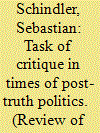| Srl | Item |
| 1 |
ID:
170021


|
|
|
|
|
| Summary/Abstract |
In this article, we elaborate two distinct ways of criticizing international practices: social critique and pragmatic critique. Our argument is that these two forms of critique are systematically opposed to each other: They are based on opposing epistemic premises, they are motivated by opposing political concerns, and they pursue opposing visions of social progress. Scholars of International Relations (IR) who want to work with the conceptual tools of practice theory are thus confronted with a consequential choice. Understanding the alternatives can help them to be more self-reflexive in their research practices and intervene more forcefully in contemporary political debates. We illustrate these advantages through a discussion of the scholarly debate on the practices of multilateral diplomacy through which the United Nations Security Council authorized a military intervention in Libya in 2011.
|
|
|
|
|
|
|
|
|
|
|
|
|
|
|
|
| 2 |
ID:
134720


|
|
|
|
|
| Summary/Abstract |
The research on international organisations (IOs) continues to be dominated by two distinctions: on the one hand, the distinction between rational choice and social construction; on the other hand, the distinction between IOs as arenas for states and IOs as actors in their own right. In this article I argue that these two distinctions structure not only our theoretical debates on IOs, but also what our theories aspire to explain: political conflicts in IOs. Through an in-depth study of two debates during a conflict in the world food organisations, I show how the distinctions were used to create lines of dispute. I conclude that research that itself establishes the distinctions on a theoretical basis is unable to grasp what conflict in IOs, since it fixes theoretically what is contested politically. What is called for is instead a practice-theoretical approach.
|
|
|
|
|
|
|
|
|
|
|
|
|
|
|
|
| 3 |
ID:
173402


|
|
|
|
|
| Summary/Abstract |
Post-truth politics poses a specific problem for critical theories. The problem is that the relativisation of facts – the claim that knowledge is merely a product of power, history, and perspective – is a core aspect of present-day ideological thinking. Critical theories have been unable to respond to this challenge, because their critique has been directed against the opposite claim, namely the naturalisation of facts. While acknowledging this problem, this article argues that post-truth discourse actually combines relativisation and naturalisation. It does not simply relativise truth, but also naturalises the belief in specific ‘facts’ – notably the belief that ‘conspiracies are behind it all’. Once we recognise the twin character of post-truth, we must reject the view of Bruno Latour and others who have made critique responsible for the crisis. Instead, it then becomes apparent that there are deep and disconcerting similarities between post-truth politics and the totalitarian and authoritarian ideologies of the twentieth century. The task of critique is to confront and counter this resurgent ideology, thereby providing direction and orientation in the struggle for emancipation.
|
|
|
|
|
|
|
|
|
|
|
|
|
|
|
|